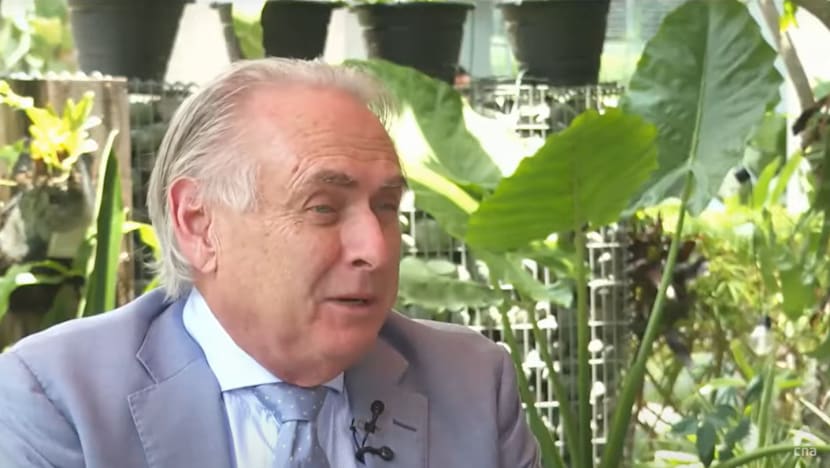‘Start of a golden age’: Australia seeks stronger trade ties with ASEAN
The Association of Southeast Asian Nations is Australia’s second-largest trade partner, accounting for 15 per cent of the country’s total trade.

Australia’s Trade and Tourism Minister Don Farrell speaking to CNA in Kuala Lumpur.

This audio is generated by an AI tool.
KUALA LUMPUR: Australia’s Trade and Tourism Minister Don Farrell said on Wednesday (Sep 24) that his country is pushing to deepen trade and economic ties with Southeast Asia, at a time when some nations are pulling back from free and fair trade.
Farrell, who spoke to CNA at the sidelines of the 57th Association of Southeast Asian Nations (ASEAN) Economic Ministers Meeting (AEM) and related meetings in Kuala Lumpur, said the region remains a key focus for Canberra’s economic strategy.
“We're just at the start of a golden age between Australia and Southeast Asia … and we value our links with ASEAN. This government has gone out of its way to build a stronger and better relationship with our nearest neighbours,” he added.
“The economies of ASEAN are growing, and they're growing fast, and Australia wants to be part of that growth story.”
Australia is part of the Regional Comprehensive Economic Partnership (RCEP) – the world’s largest trade bloc that also includes all 10 ASEAN members as well as China, Japan, South Korea and New Zealand.
The fourth RCEP ministers’ meeting took place on Thursday during the week-long AEM, which ends on Friday.
OPENING UP TO FREE, FAIR TRADE
ASEAN is Australia’s second-largest trade partner, accounting for 15 per cent of the country’s total trade.
Bilateral trade last year hit US$195 billion, with Farrell expressing confidence that ASEAN-Australia trade will experience double-digit growth in 2025.
“Already, the numbers are coming in very positively … We've seen hundreds of millions of dollars of new business, but I think we can do a lot more,” he added.
He said Australia, which is home to about 27 million people, produces enough food to feed 90 million – more than three times its population.
“As people's prosperity grows, we know that they have a demand for higher quality food and wine, and we think we can provide that. We're close; we've got reliable supply chains,” Farrell noted.
“As sections of the world are closing down to free and fair trade, we're opening up to it, and I think the opportunities are there to easily get double-digit growth.”
CONCERNS OVER US TARIFFS
Farrell also said he would be meeting United States Trade Representative Jamieson Greer, who was at the AEM amid concerns within the bloc over the impact of US tariffs on their economies.
Tariff rates are at 19 per cent and 20 per cent for most of the region. Laos and Myanmar have been hit with a 40 per cent rate, while Singapore has a baseline 10 per cent tariff.
Australian goods exported to the US are similarly subject to a 10 per cent levy, but they are separate to the industry-specific tariffs of 50 per cent imposed by the Trump administration on Australian steel, aluminium and copper.
Farrell said his message to Greer is “simple”.
“Free and fair trade is the way you increase the prosperity of your country, and we believe that going down the track of tariffs is the wrong path. So, we'll be encouraging the Americans to reconsider their position and to open up to free and fair trade,” he added.
Greer said on Wednesday that the US expects to finalise trade deals with more Southeast Asian countries in the coming months.
Malaysia’s Investment, Trade and Industry Minister Tengku Zafrul Aziz told CNA that ASEAN remains a strong draw for foreign investment despite global uncertainties.
He urged member states to strengthen collaboration and reaffirm their commitment to positioning the bloc as an attractive investment destination.
“We've come a long way, and whether we are moving fast enough – I think there's still room for improvement, simply because the world is moving faster than ever before,” Tengku Zafrul said.
“We always talk about ASEAN centrality. We always talk about ASEAN neutrality. So how do we ensure that ASEAN as a group remains relevant and leverages from each other's strengths?” he added.
RCEP MEMBERSHIP
In a joint statement issued on Wednesday, ASEAN economic ministers said expanding RCEP membership would further strengthen and diversify its economic linkages with external partners.
Hong Kong, Sri Lanka, Chile and Bangladesh have expressed interest in joining RCEP, with their ministers urging officials to expedite the process.
Farrell said Australia is “happy to have discussions” and has diversified its trading relationships over the last three years.
He also noted “great interest from around the world” in joining the Comprehensive and Progressive Agreement for Trans-Pacific Partnership – a free trade agreement between 12 economies including Australia, Singapore, Malaysia and Canada.
“I’m happy to continue to have meaningful discussions to expand all of those countries that believe in free and fair trade,” Farrell added.


















